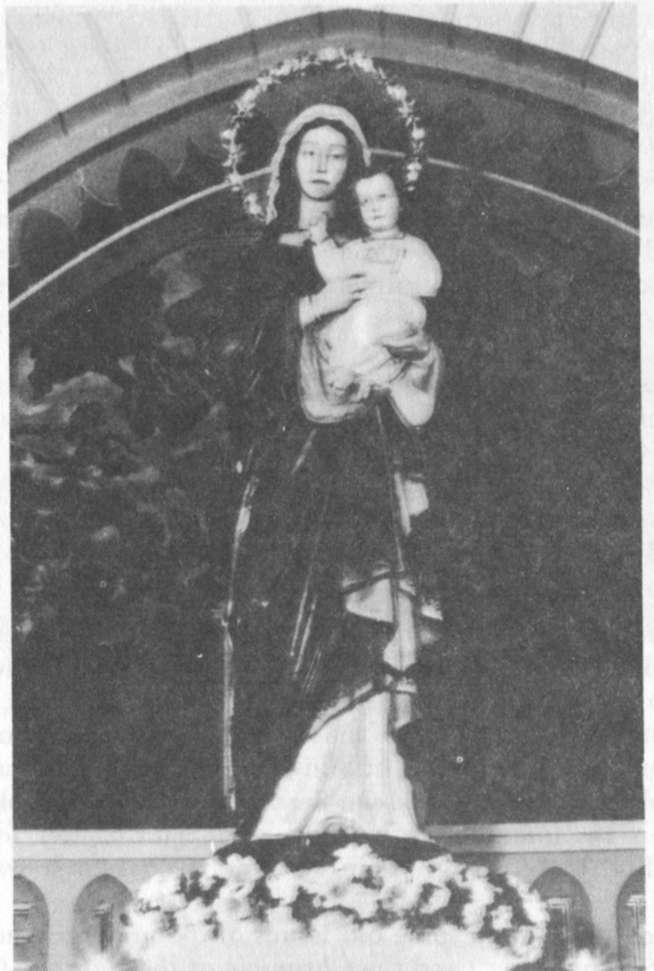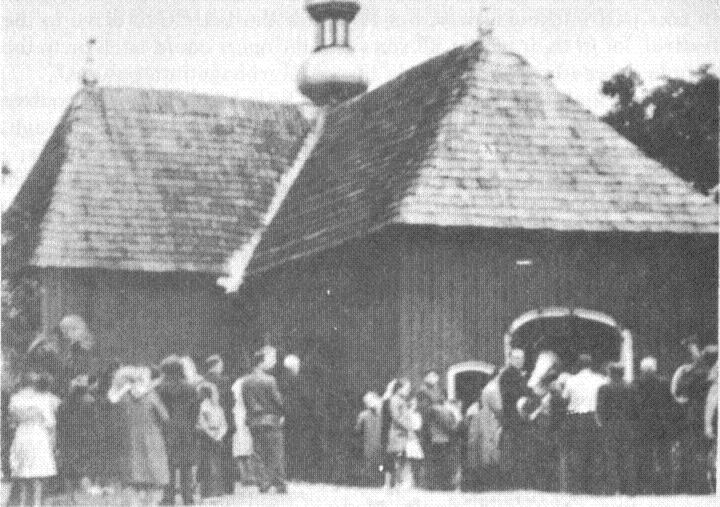Devotions at Šiluva
In Lithuania, the Feast of the Nativity of Mary is commemorated with solemn services in more than one parish, and the most famous celebrations of this feast take place at Šiluva and Trakai.
This year, between forty-five and fifty thousand devotees from all over Lithuania and neighboring republics participated in the religious festival at Šiluva. Crowds of the faithful with rosary in hand proceeded on their knees around the Marian altar in the chapel throughout the eight -day period, asking the Mother of God for protection for themselves and the persecuted Church in Lithuania. Holy Communion was distributed to the faithful, not only in the church and in the chapel, but also in the churchyard. Forty thousand people received Communion.
On Sunday, September 11, the main day of the- festival, Holy Mass was offered by Bishops Liudvikas Povilonis and Romualdas Krikščiūnas. After the services many of the faithful, among them a large number of the youth, proceeded on their knees from the high altar and around the church, praying the rosary. Leading the faithful were Fathers Vaclovas Stakėnas and Leonas Kalinauskas. The past two years, the procession was led by Father Alfonsas Svarinskas.
On September 13, on commemoration of the appearance of the Mother of God at Fatima, Holy Mass was solemnly concelebrated by His Excellency, Bishop Julijonas Steponavičius, and thirty priests. On that occasion, Bishop Steponavičius delivered an impressive sermon.
On September 14, they prayed for national sobriety. About thirty priests concelebrated the Mass. A sermon on sobriety was preached by Father Petras Puzaras.
On September 15, the final day of the festival, after the High Mass and solemn procession, a new monument erected on the grave of Bishop Labukas — a cross — was blessed by Bishop Vincentas Sladkevičius who also preached.
On September 12, the Pastor of Pociūnėliai, Father Antanas Jokubauskas, made use of a half-hour interval between services in church to deliver from the pulpit a down-to-earth sermon, mentioning the chekists persecution of the Church in Lithuania. For this, the KGB interrogated the pastor of Šiluva, and berated him for allowing Father Jokubauskas to speak. On September 13, Father Jokubauskas was taken by force to Radviliškis, and interrogated for several hours, while in his lodgings in Pociūnėliai, a search was carried out.
During the search, some old issues of the underground publication Aušra (The Dawn) and the Chronicle of the Catholic Church in Lithuania were found and confiscated. September 15, Father Jokubauskas, making use of a free period, once again addressed the faithful from the pulpit. He explained with what means the atheists in Lithuania are fighting against the Faith, and told listeners about the interrogation and the search which the chekists had carried out.
The active participation of large numbers of the faithful at the devotions in Šiluva aroused much unrest and concern among the atheists. According to information from the Traffic Department, on Sunday alone about 4000 cars showed up at the festival. Raseiniai Rayon taxi drivers were forbidden to drive people in the direction of Šiluva. Many thousands waited in the bus station at Raseiniai

A statue of Our Lady of Šiluva located at the historic shrine. In recent years , large numbers of young pilgrims have been attracted to the Marian devotion there.
to go to Šiluva by bus. In Šiluva, there were many uniformed militia, KGB and detectives, constantly watching the pilgrims.
According to information available, the faithful of Riga did not reach Šiluva, even travelling in two hired buses. They were questioned and returned to Riga. (See Chronicle No. 61 — Trans. Note)
On September 11, a small group of the faithful from Kybartai (about twenty people), walked from Tytuvėnai to Šiluva reciting the rosary. About two kilometers from Šiluva, militiamen ordered them into a bus and took them to Raseiniai Militia Headquarters, after writing down their names. KGB agent Kavaliauskas and the assistant chief of militia ordered everyone to write explanations of their actions, but the faithful refused, arguing that they had not committed any crime. Minors and children who were there without their parents, they threatened to hand over to the inspector of the children's home, buy the children, without breakfast until 2:00 PM, escaped as soon as they found an opportunity.
Varduva
From July 2 to July 10, 1983, while the great religious festival of Žemaičių Kalvarija (Calvary of the Samogitians) was in progress in Varduva, orders were given forbidding superiors to excuse the faithful, especially the youth of the neighboring rayons from work, on days when they would ordinarily be off from work. Special obligatory affairs were scheduled, particularly in youth work and rest camps, preventing pupils on festival days even from going home.

Pilgrims at the Shrine of Žemaičių Kalvarija.
Participants in the processions on this occasion were scrutinized from a distance witn the aid of binoculars and by KGB agents mingling with the crowds. Two thousand more people received Communion this year than last — about twenty-two thousand in all. On July 6, called Priests' Wednesday, about one hundred fifty priests came to the festival with a large crowd of the faithful. Ninety priests joined Bishop Antanas Vaičius in concelebrating the Mass for sobriety. Only priests from a government-approved list were allowed to preach during the festival. Father Jonas Pakalniškis, in his sermon, mentioned the name of Father Alfonsas Svarinskas, and for this "offense', he had to explain himself at the Pungė Rayon Executive Committee. During the days of the festival, officers, zealously guarded Panų Kalnas (Maiden Hill). (Well-known historical-religious shrine — Trans. Note. See Chronicle No. 53).
Kėdainiai
On Sunday, September 14, 1983, the faithful of the parish of Kėdainiai decided to go on foot, reciting the rosary, to the Jubilee Year of Redemption ceremonies in Josvainiai, ten kilometers away. Father Vaclovas Ramanauskas, Pastor of the church in Kėdainiai, announced this journey in advance, from the pulpit. The entire Kėdainiai Rayon government, having found out about it, ordered the local priests not to take part in this journey, but to advise the faithful to drive to the festival, for in their words, all sorts of interlopers could latch on to the people proceeding on foot and "turn a pilgrimage into politics".
Vice Chairman Juškevičius of the Kėdainiai Rayon Executive Committee and Secretary (Mrs.) Grudienė of Josvainiai brought the pastor of the parish in Josvainiai, Father Leonas Kalinauskas, a warning to acknowledge in writing that there must be no procession beyond the churchyard during the festival (August 14). The priest did not sign the warning.
In spite of the various advance warnings, the pilgrimage to the Jubilee Year of the Redemption festival took place: The faithful, reciting the rosary aloud, and accompanied by KGB and traffic police cars, arrived on foot at the church of Josvainiai.
Kražiai (Rayon of Kelmė).
On August 21, during the Feast of Saint Roch, the ninetieth anniversary of the bloody massacre perpetrated by the Czar's cos-sacks was commemorated.
At first, preparations were made to hold the commemoration on the 14th. That day, Kražiai was full of KGB and militia officers.
The pastor of Kražiai was warned that no commemoration was to take place. When the pastor said, "It was the Czar's doing, and we all condemn it," a KGB agent told him not to play the fool, for "you know perfectly well that this is the same salt."
Regardless of all efforts on the part of the KGB, the commemoration took place in church. Under the leadership of the youth, the faithful made the Way of the Cross, honoring the sacrifice of those who had defended the church of Kražiai.
After Mass, Father Juozas Zdebskis spoke a few words recalling that terrible event, when the blood of innocent people ran in rivulets, dyeing the Kražantė Stream.
Father Zdebskis said that today the Church is also persecuted, in an effort to destroy the Faith. He mentioned the latest martyrs, Father Alfonsas Svarinskas and Father Sigitas Tamkevičius, as victims for the Faith and for the Church. Afterwards, the devotees proceeded on their knees about the church, on the same carpet which ninety years earlier had been sprinkled with the martyrs' blood.
At the end of the commemoration, young religious believers lowered into the Kražantė Stream a wreath woven out of leaves.









